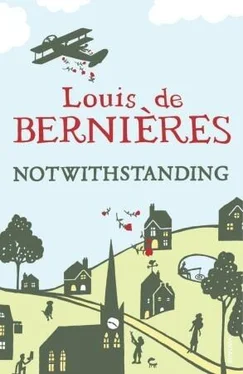‘A what, dear?’
‘A passing bell. The Striking Out for the Dead. I’ve heard it before somewhere. I’m sure that’s what it is. It’s what they always used to do.’
‘I’m sure you’re right,’ said his wife, who of course had no idea what he was talking about.
‘I’d better go.’
‘Oh why? Do you have to? It’s awfully cold, and the road’ll be frightfully skiddy.’
‘I’m going, I really think I ought to be going.’ He went into the hall, and swathed himself in scarf, hat and gloves. He went to the back door and fetched his wellington boots, just in case the car couldn’t manage and he was obliged to walk back.
It was frightening in the extreme trying to get the Singer up the hill, but fortunately there had been no other cars using the road since this morning’s service, and so the snow had not yet been packed into ice. In first gear, and with one or two alarming reverses, he made it up the slope, frequently wiping the condensation from the windscreen with the back of his driving glove. It was freezing up again the moment he got it clear. Leaving the engine running so that the demister could get to work on the glass, he crunched his way through the virgin snow to the door of the church, and pushed it open. It seemed far colder inside than it had been out in the fresh air. The tolling of the bell ceased, and a second later someone emerged from behind the curtain that separated the bell tower from the nave.
The old woman in the long black dress with the white lacy collar approached him, and brushed lightly past. He caught a scent of mothball and lavender. She turned at the door, and looked at him imperiously for a few moments, as if appraising him steadily. She nodded, and said simply, ‘Sir Edward.’ He watched her go, looking in wonder and stupefaction at the ground beneath her elegant laced-up ankle boots. She opened the gate, waved and smiled courteously, and set off down the hill without the slightest regard to the snow.
After another frightening and erratic journey, the Reverend Freemantle found the Rawcutt house in turmoil. Lady Gemma answered the door, her face pale and her lips trembling, exclaiming, ‘Oh Godfrey, thank God you’re here. How did you know?’
‘Where is he?’ he asked.
Sir Edward, dressed in a dinner jacket, bow tie, red cummerbund and wing collar, was laid out on his back on the drawing-room floor, with his lips blue, his florid complexion vanished away, his eyes staring and his mouth wide open. He had a sprig of holly in the lapel of his dinner jacket, and a gold paper hat lay beside him on the floor. He was plainly dead. ‘Oh God,’ said the priest, dropping to his knees beside the body. He bent down to listen for a breath, and then sat back on his heels. Without knowing precisely what to do, he made the sign of the cross on the dead man’s forehead, and said, ‘The Lord gave and the Lord hath taken away. Blessed be the name of the Lord.’ Then he sighed, and said, ‘Goodbye, old fellow. Bon voyage.’
‘We’re waiting for the ambulance,’ said Lady Gemma. ‘We tried the kiss of life, and everything, and the ambulance’ll never get here with all this snow. Oh Godfrey, it’s just too awful.’
‘It’s too late for an ambulance,’ said the priest. ‘We should all just take this chance to say goodbye.’
Reverently they formed a kind of ring around the dead man. Two sons and a daughter, their spouses, Lady Gemma, the Rector and the family dogs. Those who were not sobbing were waiting numbly for the tears to come. From the doorway peered in the confused white faces of four small grandchildren, all of them dressed in their best party clothes.
‘What happened?’ asked the priest.
‘We were playing “Are You There, Moriarty?”’ said Lady Gemma. ‘It was his favourite game, he loved it. It’s so silly, it was right up his street.’
‘“Are You There, Moriarty?” I know that one. He made me play it once. Well, it’s good to know that he died having fun. Good old Edward.’
It was a highly energetic and hilarious game in which blindfolds were placed on the two contestants, who were then laid down on the floor, facing each other and holding the other by the left hand. In their right hand, each one held a rolled-up newspaper. They took it in turns to ask ‘Are you there, Moriarty?’ in the strongest and most bogus Irish accent possible, whereupon the other would have to reply ‘Here I am, to be sure!’ and then move out of the way to avoid being struck by the rolled-up newspaper. The first to achieve ten successful strikes was the winner.
‘Did he win?’ asked the priest.
‘He always won,’ said Lady Gemma, smiling through her tears, ‘he was a grand master.’
‘He died laughing,’ said his daughter, ‘he was doing his victory dance, and then he just went straight down.’
The Reverend Freemantle remembered Sir Edward’s victory dance very well. He had been known to perform it on the cricket green, and beside the eighteenth green of the golf course, right in front of the clubhouse. He did it even if he had merely won a prize in a tombola. It was a flamboyant business, involving much whooping, cavorting, prancing and stamping which he swore he had learned from a Cherokee, whose acquaintance he had once made in Dorking during his rugby-playing days.
It turned out to be the saddest Christmas in the parish since the year that almost an entire family had perished on the night of St Stephen’s Day, in a fire brought about by candles on a tree. It was a melancholy time, doubly remembered still for its beautiful mantle of snow and for the entire village turning up to the funeral, during which the Reverend Freemantle had wept throughout his entire oration, but without any break in his voice.
At the drinks and canapés party after Sir Edward’s burial, the Reverend Godfrey Freemantle found himself, glass in hand, standing before a large portrait facing the staircase. He gazed at it for some minutes, and then called to Lady Gemma, who was passing by with a small silver tray loaded with cocktail sausages. She was pale, but very becoming in her black dress and hat. She had been making conversation and smiling bravely, even though she felt that really now there wasn’t much to live for. It was doubly difficult to lose a man who had been well loved by so many, because the nice things they were saying made her want to cry.
‘Who’s this?’ asked the Rector, indicating the portrait with his glass.
‘Oh that,’ said Lady Gemma. ‘It’s Edward’s grandmother, Jenny. She absolutely adored him apparently. She called him Tedda and told the most marvellous stories. He’s got a drawer somewhere full of all the toys she gave him when he was tiny, and every year on her birthday we went to her grave and put flowers on it. I think he loved her more than he loved his mother, to be honest. She’s in the churchyard in Chiddingfold.’
‘Do you know much about her?’
‘Only what Edward used to tell me. I never knew her; she was before my time. Why?’
‘I wondered where I’d seen her before,’ said the priest. ‘Of course, it was this picture. I must have seen it every time I came here, and never really noticed.’ He smiled at Lady Gemma, raised his glass and said, ‘Here’s to the old lady.’ He took a draught of the champagne, and said, ‘I know something about Grandmother Jenny that you don’t.’
‘Really?’ she said.
‘Oh yes, I certainly do.’ He fell silent, took another sip from his glass, paused, and said, ‘She leaves no footprint in the snow.’
THE HAPPY DEATH OF THE GENERAL

Читать дальше













